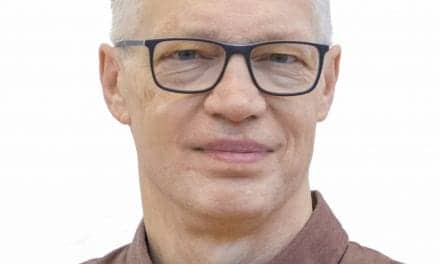Educator and icon Robert Panara, the first deaf faculty member of Rochester Institute of Technology’s National Technical Institute for the Deaf (RIT/NTID), is being honored by the US Postal Service with a stamp. The 16th stamp in the “Distinguished Americans” series features Panara, an influential professor and pioneer in the field of Deaf Studies and one of the founders of the National Theatre of the Deaf.
According to RIT/NTID, the stamp was created from a photograph of Panara signing the word “respect” taken by RIT/NTID photographer Mark Benjamin and was designed by USPS art director Ethel Kessler.
“I’m very proud to see my dad honored and Deaf culture recognized in this way, and I want to thank the personnel at the USPS Stamp Development Office for all their work in the design process,” said Panara’s son, John, himself a faculty member at RIT/NTID.
During his teaching career, Panara inspired generations of students, and his powerful use of American Sign Language to convey Shakespeare and other works of literature made him much beloved and respected by students and colleagues alike.
Panara was born hearing in Bronx, NY. At age 10, he contracted spinal meningitis, which left him profoundly deaf. He attended mainstream public schools and often relied on classmates to take notes for him or mouth words so he could lipread. He graduated from DeWitt Clinton High School in New York City, learned sign language at the American School for the Deaf in Hartford, Conn, and then earned a bachelor’s degree at Gallaudet College (now Gallaudet University) in 1940, where he wrote several papers that established him as a leader in the field of deaf education. “The Significance of the Reading Problem” expressed his belief that “what the world needs today is more teaching that comes from the heart and soul and not of the coldly conservative and somewhat reticent mind.” This insight would form his teaching style. Panara’s love of drama and theater made his classes some of the most sought after by both deaf and hearing students.
In 1965, he was invited by US Secretary of Education John Gardner to serve on a national advisory board for the establishment of NTID. He began his career at NTID in 1967 and became its first deaf professor. He also established the English department at NTID where his son, John, currently teaches. Throughout the years, Panara won a number of awards and distinctions, including the RIT Founders Award, the NTID Student Association Outstanding Staff Award, and the RIT Eisenhart Award for Outstanding Teaching. He also held honorary degrees from Gallaudet University and MacMurray College. He founded the NTID Drama Club and in addition to being a founding member of the National Theatre of the Deaf, has been honored by the World Federation of the Deaf for his contributions to education and culture.
Panara, who passed away in July 2014 at the age of 94, was an avid poet, lover of Shakespeare and theater, and fan of baseball and the Rochester Red Wings.
“Bob Panara’s contributions to the field of Deaf Studies, theater and education are indeed worthy of celebrating,” said Gerard Buckley, NTID president and RIT vice president and dean. “RIT/NTID and the entire Deaf community are justifiably proud that Bob is being honored in such a meaningful way.”
The formal Date of Issue will take place at a ceremony in April 2017 in Rochester, NY, home to RIT/NTID where Panara taught for 20 years.
Rochester Institute of Technology is home to leading creators, entrepreneurs, innovators and researchers. Founded in 1829, RIT enrolls about 19,000 students in more than 200 career-oriented and professional programs, making it among the largest private universities in the US. The university is internationally recognized and ranked for academic leadership in business, computing, engineering, imaging science, liberal arts, sustainability, and fine and applied arts. RIT also offers unparalleled support services for deaf and hard-of-hearing students. The cooperative education program is one of the oldest and largest in the nation. Global partnerships include campuses in China, Croatia, Dubai, and Kosovo.
Source: RIT/NTID News





